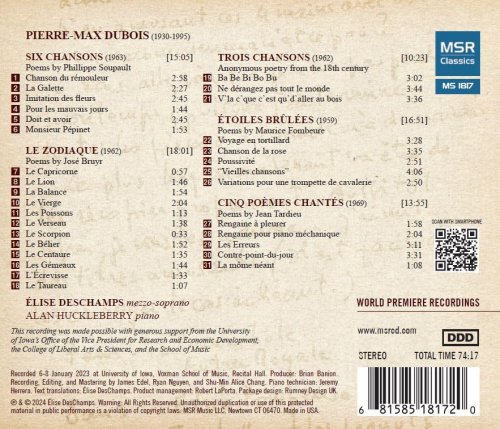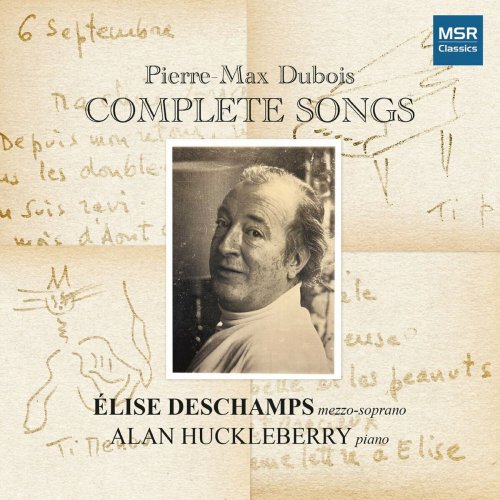
Élise DesChamps - Pierre-Max Dubois: Complete Songs (2024)
BAND/ARTIST: Élise DesChamps, Alan Huckleberry
- Title: Pierre-Max Dubois: Complete Songs
- Year Of Release: 2024
- Label: MSR Classics
- Genre: Classical
- Quality: FLAC (tracks)
- Total Time: 74:15 min
- Total Size: 256 MB
- WebSite: Album Preview

Tracklist:
01. Six Chansons: I. Chanson du rémouleur
02. Six Chansons: II. La Galette
03. Six Chansons: III. Imitation des fleurs
04. Six Chansons: IV. Pour les mauvais jours
05. Six Chansons: V. Doit et avoir
06. Six Chansons: VI. Monsieur Pépinet
07. Le Zodiaque: I. Le Capricorne
08. Le Zodiaque: II. Le Lion
09. Le Zodiaque: III. La Balance
10. Le Zodiaque: IV. Le Vierge
11. Le Zodiaque: V. Les Poissons
12. Le Zodiaque: VI. Le Verseau
13. Le Zodiaque: VII. Le Scorpion
14. Le Zodiaque: VIII. Le Bélier
15. Le Zodiaque: IX. Le Centaure
16. Le Zodiaque: X. Les Gémeaux
17. Le Zodiaque: XI. L’Écrevisse
18. Le Zodiaque: XII. Le Taureau
19. Trois Chansons: I. Ba Be Bi Bo Bu
20. Trois Chansons: II. Ne dérangez pas tout le monde
21. Trois Chansons: III. V’la c’que c’est qu’d’aller au bois
22. Étoiles Brûlées: I. Voyage en tortillard
23. Étoiles Brûlées: II. Chanson de la rose
24. Étoiles Brûlées: III. Poussivité
25. Étoiles Brûlées: IV. Vieilles chansons
26. Étoiles Brûlées: V. Variations pour une trompette de cavalerie
27. Cinq Poèmes Chantés: I. Rengaine à pleurer
28. Cinq Poèmes Chantés: II. Rengaine pour piano méchanique
29. Cinq Poèmes Chantés: III. Les Erreurs
30. Cinq Poèmes Chantés: IV. Contre-point-du-jour
31. Cinq Poèmes Chantés: V. La môme néant
In 1963, Pierre Max Dubois (or PIMADU, as he often signed his personal notes and letters) composed Six Songs – voice and piano or voice and small orchestra – for French baryton-martin singer Camille Maurane (1911-2010), who was well-known for his interpretations of Debussy’s Pélléas et Mélisande and for creating numerous roles at the Opéra-Comique in Paris. The songs, based on the poems of Dadaist writer Philippe Soupault (1897-1990), were chosen from diverse poetry sets: Chansons (1921-1937), Chansons du jour et de la nuit written (1947) and Chansons vécues (1948-1949). Soupault, inspired by Apolinaire, wrote chansons instead of poems that he sang as he was writing them. For this reason, he would refuse to use any punctuation, which Dubois obliged. Dubois, like a cartoonist, creates a theatrical panorama of six unusual personalities. Dubois composed twelve songs in 1962 based upon Belgian writer José Bruyr (1889-1980); one for each sign of the Zodiac. In the set, each song describes the precise traits of each celestial sign, and each song has its own unique voice and mood. Dubois illustrates varied movements with brilliance and clarity in his own designed Tone-Zodiac. The Zodiac was dedicated to Claudia Barreau, a former professor at the Geneva Conservatory of Music in Switzerland and at the Ferney Conservatory in France. In 1962, Dubois was inspired by anonymous poetry from the 18th century to write the three songs heard in this collection. Ba be bi bo bu was originally written for soprano and piano or harpsichord, Ne dérangez pas tout le monde and V’la c’que c’est qu’d’aller au bois for tenor or soprano, and piano or harpsichord. Dedicated to Michel Sénéchal (1927-2018), a French tenor, these secular songs are playful ballades, which are reminiscent of the time of the minstrels and troubadours. From a collection of seventy poems composed in 1950 by French writer and poet Maurice Fombeure (1906-1981), Dubois used only five poems and composed his Étoiles brûlées (Mischievous Stars) in 1959 adding shining echoes of oldtime French songs to the vocal library. The last song is from the second part of the Étoiles brûlées called Sous l’étoile de la licorne (Under the Unicorn Star) and the other four songs are from the first part named J’apprivoise par jeu (I Learn Through Play). Again, Dubois dedicated these songs to Sénéchal. Five Sung Poems for bass and piano dates from 1969 and bears a dedication to Roger Soyer (b.1939), a French operatic bass-baritone, predominantly associated with French repertory and Mozart. The poetry is from Jean Tardieu (1903-1995). Le Môme néant and Les Erreurs are from a first set of poems called Monsieur Monsieur (1948-1950), Rengaine à pleurer and Rengaine pour piano mécanique come from a 1951 publication of the same title with an added subtitle Chansons avec ou sans musique, and Contre-point-du-jour is from Une voix sans personne (1951-1953). Dubois’ last song cycle offers five main characters with contrasting stories and declamatory speech that range from a cappella, monophonic, unison and spoken dialogue, to plaintive and illogical. Pierre-Max Dubois (1930-1995) was born in Graulet (France) and died in Rocquencourt (France). He studied at the Paris Conservatory from 1949-1953 under Jean Doyen (piano) and Darius Milhaud (composition). He was later professor of analysis at the Paris Conservatory. While he is widely known as one of the preeminent composers of the 20th century for woodwind instruments, particularly the saxophone, he has a vast opus of works for the stage (ballets and operas), strings, and piano. His songs are relatively unknown, and this CD presents the first published recording of his complete songs. A great advocate for arts education, Dubois was a close friend of Claude DesChamps and Lorraine Prieur, parents of Élise DesChamps. Claude was founder of the Canadian Music Competition and Dubois composed works for Lorraine. The three of them traveled across Canada, judging the competition, and providing valuable educational experiences for innumerous young musicians everywhere they went. A native of Montréal, Canada, mezzo-soprano Élise DesChamps is praised for her dark, rich mezzo-soprano voice, and sensitive musicianship. DesChamps is also a highly sought-after teacher and master clinician. From 2007-2019, she was a member of the voice faculty at Capital University in Columbus, Ohio, and since then has been on faculty at the University of Iowa. DesChamps appeals to audiences and critics alike as a compelling and charming artist in opera, oratorio, and concert. She has been praised by Opera News for her “ability to handle coloratura effusions while bouncing with exhilaration about the stage,” her Carmen was described as “rich, powerful, sensuous; the audience who observed her actions and heard her dark, rich mezzo-soprano voice admired her vocal and dramatic skills,” and her debut with Opera Columbus was celebrated as “vocal brilliance and radiant beauty; the warmth of her voice and the fragrance of her beauty lend themselves to her sprite-like believability.” DesChamps earned her DMA from The Ohio State University, where she studied with Scott McCoy. She received her Master of Music degree from Indiana University Jacobs School of Music, where she studied with Virginia Zeani and Costanza Cuccaro. DesChamps is an alumna of the Conservatoire de musique et d’arts dramatiques du Québec à Montréal. Praised for his “impeccable musicianship, exhilarating technique, and panache” (American Record Guide), pianist Alan Huckleberry is recognized as a multifaceted artist on the classical music scene. He has performed both in solo recitals, as a soloist with orchestras, as well as a chamber musician across Europe, North and South America, as well as Australia. He can be heard on 15 CD title. His recording of the complete wind and piano chamber music of Francis Poulenc was named one of the top classical releases of 2015. In addition to his performing career, Dr. Huckleberry is equally passionate about his role as an educator. He is currently professor of piano pedagogy and collaborative arts at The University of Iowa. There he heads the piano pedagogy program, which is now recognized as one of the leading programs in the nation. He is sought-after speaker on pedagogical topics, including talks at the National Conference on Keyboard Pedagogy, the Music Teachers National Conference, as well as guest clinician at many state conferences. At the University of Iowa, he also maintains a studio of national and international students, who themselves are leaving their mark in their field.
Year 2024 | Classical | FLAC / APE
As a ISRA.CLOUD's PREMIUM member you will have the following benefits:
- Unlimited high speed downloads
- Download directly without waiting time
- Unlimited parallel downloads
- Support for download accelerators
- No advertising
- Resume broken downloads


